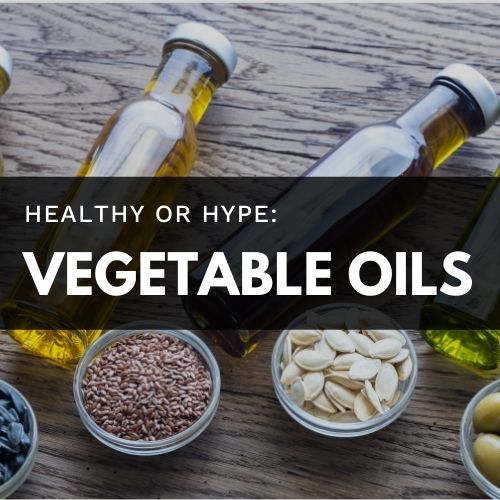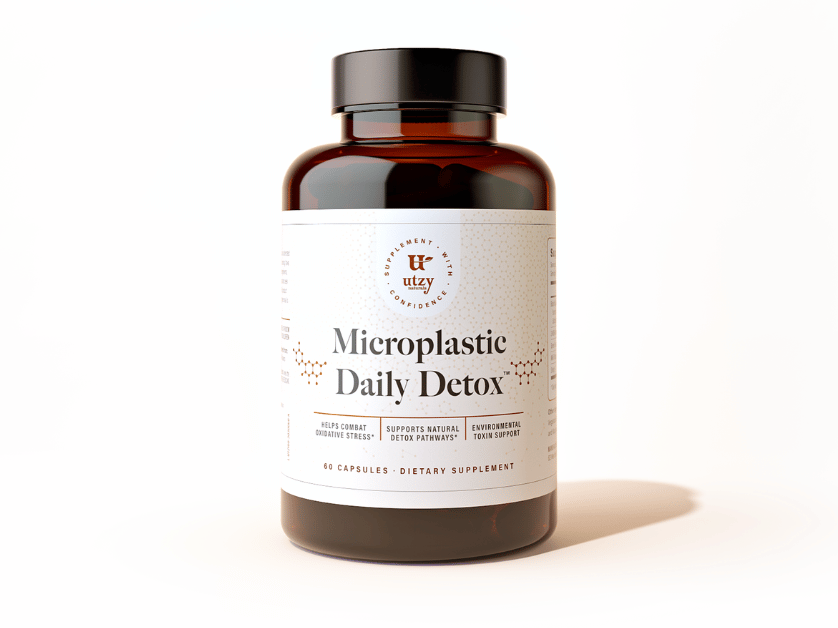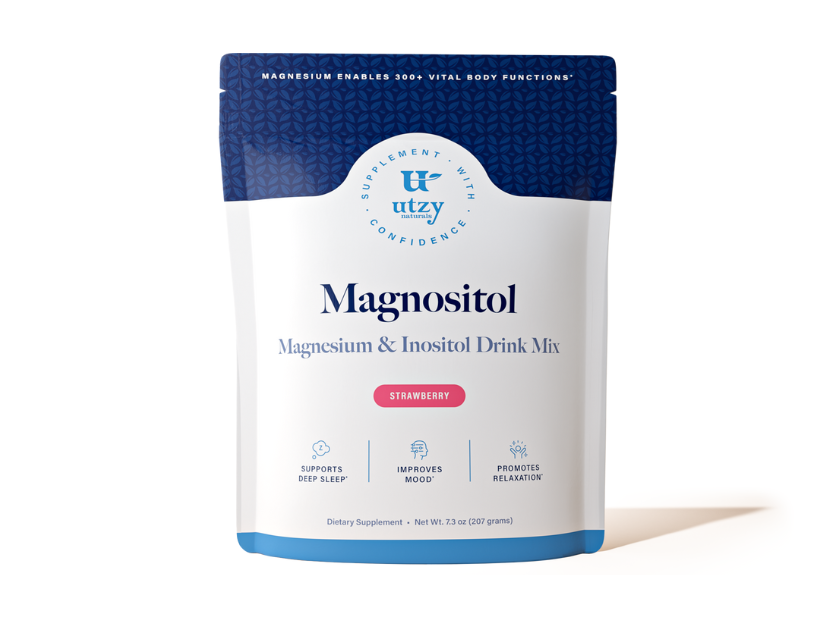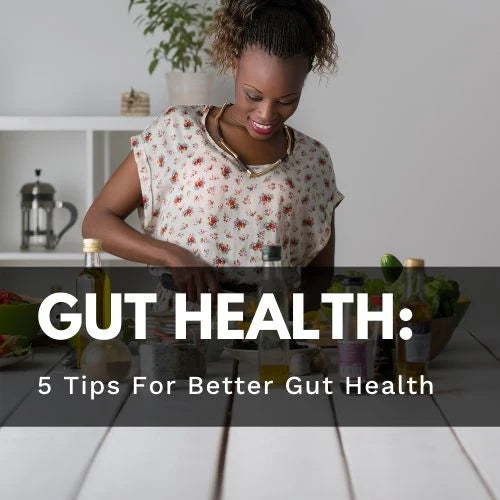shop
learn

Healthy or Hype: Are Seed Oils Dangerous?
March 05, 2024 6 min read
If you've heard it once, you've heard it a thousand times:
"Just eat more vegetables”
For those seeking to improve their health and wellness, this is a guiding principle of vitality that is universally accepted as truth.
That being said, if vegetables are so good for me, why might vegetable oils be so dangerous?
Vegetable oils are a controversial topic, and not just among opinionated health officials. Over the years, scientific studies have produced differing results, indicating a mix of good, neutral, or even bad health outcomes associated with eating vegetable oils.
Feeling slightly confused?
You’re not alone.
In this article we’ll take a brief look at what these oils are, why they’re controversial, and what we (as health-seeking consumers) might choose to do about it.

What are Vegetable Oils?
"Vegetable oils" is an umbrella term for any oil that is extracted from plants, seeds, and fruits. Olive, soybean, canola, grape seed, cottonseed, corn, coconut, peanut, sunflower, and palm oil are just a few examples of the “family” of vegetable oils.
These oils are extracted from the plants using either one or a combination of two processes: Chemical extraction (bathing plants in various chemicals to "wash" the oil residue out of the plants) or mechanical extraction (physically squeezing the oil out of the plants).
Vegetable oils are not new to the culinary scene and may date back to as early as 2000-3000 b.c.
However, both the volume and types of oils being consumed has exponentially increased in the past 100 years due to the rise of food industrialization techniques which make mass production of vegetable oils easy, fast, and generally inexpensive.
Why are Seed Oils Controversial?
Currently, the U.S. healthy eating guidelines label vegetable oils as "heart healthy" products and recommend them to be consumed in the place of "bad" fats, such as trans-fats or saturated fats.
This is because vegetable oils generally lower the total cholesterol levels in our blood (1,2,3).
For many years, cholesterol levels have been thought to be directly related to the risk of developing heart disease.
However, the premise that vegetable oils protect the heart and are beneficial for health outcomes is currently being challenged by modern research and analysis on the basis of two arguments.
First, there is mounting evidence that cholesterol alone may not directly increase heart disease risk (4,5).
One of the primary reasons vegetable oils were recommended for use is because they help lower serum cholesterol levels. If the link between cholesterol and heart disease turns out to be weak, the original premise that vegetable oils are "heart healthy" may no longer be completely valid.
Secondly, some studies indicate that specific vegetable oils that have high omega-6 fat composition actually appear to increase the risk of heart disease or general “all-cause” mortality (6,7,8).
And it is upon this argument, the potentially harmful effects of omega-6 rich oils, that the primary controversy rages today.
So Are Oils High in Omega-6 fats the Problem?
Omega-6 fats are not inherently unhealthy. In fact, they are an essential fat, meaning humans must get enough of them from our diet in order to be healthy and function properly, 12-17 grams per day being the recommended amount.
Small amounts of omega-6 fats are naturally found in many plant based foods such as nuts and seeds. A diet that includes these foods will allow us to obtain these essential fats from these sources, in small, reasonable amounts.
However, due to refinement and processing, vegetable oils can become highly concentrated sources of these fats. One tablespoon of omega-6 rich oil can provide approximately 10-14 grams of these fats, which basically meets the recommended daily intake.
In 2015, it was estimated that the average American consumes between 5-10 tablespoons of vegetable oil each day which is 5-10 times the recommended intake (9)
Since regular consumption of these oils and/or foods made with them can easily exceed the recommended daily intake for omega-6 fats, this led some to wonder if overconsumption of omega-6 fats could be harmful to health.
A popular hypothesis is that consuming too many omega-6 fats leads to systemic or chronic inflammation. While this is still debated (see a trend yet?), mounting evidence (much from human studies) appears to disprove this idea (10,11,12,13,14).
At this point, it is doubtful that merely increasing consumption or “quantity” of omega-6 fats leads to negative health effects.
So if not quantity, what about quality? Does it matter how or in what manner I’m consuming omega-6 fats?
Omega-6 Fats and Heat
As previously mentioned, omega-6 fats are one of the polyunsaturated fats (PUFAs) which happen to be some of the most unstable forms of fat.
When heated to certain high temperatures, PUFAs begin to break down and form some potentially harmful compounds, such as oxidized free radicals, aldehydes, and trans fats.
Ironically, omega-6 rich oils are some of the most commonly used oils for deep fried foods. Some reports have found that it only takes 20-30 minutes near 360°F to rapidly produce aldehydes in omega-6 rich vegetable oils.
Even worse, reheating/re-using this oxidized oil appears to even further exacerbate oxidation and radicalization.
You may be thinking at this point, “No big deal. I mostly avoid eating fast food or deep fried foods.”
Unfortunately, vegetable oils are often exposed to high temperatures during the extraction and refining processes while simply being produced.
Chemical extraction and some forms of mechanical extraction generate enough heat that these omega-6 rich oils may begin to oxidize even before being bottled.
In other words, exposure to these unfavorable compounds may occur even if simply using vegetable oils in home cooked meals.
Are Seeds Oils Dangerous?
By now, I think you can say it along with me: “It's controversial.”
Nutritional experts on both sides of this debate can point to data that supports their stance and we are far from a general consensus.
While future studies will hopefully bring more traction to this slippery topic, mounting evidence does appear to suggest that consumption of omega-6 rich oils may be harmful to health.
Especially when they have been exposed to high temperatures.
So What Should I Do?
In light of the on-going controversy, the following recommendations are based on current data (as well as some common sense).
1. Decrease Consumption of Omega-6 Rich Vegetable Oils
These bad oils include: soybean, sunflower, grape-seed, cottonseed, and corn oils.
Eat less deep fried foods and ready-prepared packaged meals as these are commonly fried in omega-6 rich oils.
Furthermore, try to obtain omega-6 fats from natural, whole food sources that don't involve high heat, such as nuts (walnuts, almonds, cashews, peanuts, and nut butters), seeds (hemp, sunflower seeds, pumpkin seeds) and other foods such as eggs.
Remember, omega-6 fats themselves are not harmful, the oxidation that can occur from exposure to high heat appears to be the factor leading to unhealthy outcomes.
2. Cook With (and predominantly use) Healthier Vegetable Oils Such as Avocado and Olive Oil
These oils are low in omega-6 and high in monounsaturated fats (MUFAs) which are more stable and resistant to oxidation.
Make sure to look for oils labelled "cold pressed" or "virgin/extra virgin" as these generally indicate that the oil was made without chemical extraction or high heat processing.
3. Eat More Omega-3 Fats
Not only are omega-3 fats linked to a host of incredible health benefits but also appear to counteract some of the potential damage caused by omega-6 fats.
Animal foods rich in omega-3s include fatty fish (wild caught salmon, sardines, mackerel), oysters, and grass fed animal meat while plant foods include walnuts, chia seeds, flax seeds, and flax oil.
Additionally, supplements such as a high quality fish oil like our Omega-3 Fish Oil can help add omega-3s to your diet.
4. Lower Your Omega 6:3 Ratio
Most Americans currently consume an average ratio of 16:1 and 20:1 omega-6 fats to omega-3 fats, or rather 16-20 grams of omega-6 per 1 gram of omega-3.
While the current healthy eating guidelines recommend approximately a 10:1 ratio (15), many experts recommend closer to a 4:1 ratio based on historical/ancestral eating habits.
Therefore, you may consider consuming a diet that provides between a 4:1 and 10:1 ratio, or in simpler terms, 4-10 grams of omega-6 fats per 1 gram of omega-3 fats.
Conclusion
In the past century, the exponential availability and consumption of vegetable oils mirrors a similar rise in chronic disease; fueling a controversy regarding the health efficacy of these products.
This is a complex issue due to the many different factors at play such as extraction methods, the composition of fats in the oil, how the oil is used in food preparation, as well as how the oil actually reacts once ingested.
Until the scientific dust settles, the safest approach appears to favor eating less omega-6 rich oils as well as foods prepared with them.

Leave a comment
Comments will be approved before showing up.
Also in Health
Subscribe
Sign up to get the latest on sales, new releases and more …
Join the Utzy Naturals Club!
Sign up and get the latest on sales, new releases, and more...







